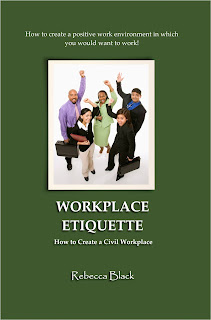One
of my jobs as an etiquette consultant is to train job candidates for interviews,
which is becoming more and more difficult in this time of personal
disconnect. By this, I mean, that many
people simply do not know how to talk to another face to face. Many more do not know the simplest of manners
as well. Combine these behaviors and the
interview process often becomes a source of comedy relief.
But how about the common virtual interview? You’re
not off the hook. Personal skills are amplified
through the computer screen.
To
keep me up to date with the interview process,
I have contacts within various industries.
Insiders have shared these stories.
There was the job candidate who showed up in his gym clothes stating he
didn’t have time to change. Many answer
their cellphones and text during the
interview. Moreover, most don’t make
good eye contact or seem to care about anything.
Since
this appears to be a prevalent problem, I’ve decided to share what some of my
contacts say is the top three qualities
they look for in a potential employee.
What three qualities do
interviewers look for when interviewing potential retail employees?
With
the bulk of his experience with multi-unit and big-box retailers, Steve Larson,
a management consultant has interviewed and hired individuals for entry-level, front-line,
and mid-level employees since 1985.
Steve states that “Engagement, passion for service – external and
internal – and drive to exceed expectations” are the top three traits he looks
for in a potential employee.
He
also emphasizes the need for the candidate to do his homework. Steve states that “a candidate would benefit
in reviewing situational questions that will spotlight the candidate’s ability
to facilitate an engaged team, demonstrate critical thinking, and a passion for
servicing others—internal and external.
What three qualities do
interviewers look for when interviewing potential tech employees?
Charles
Jo, a recruiter for Power Integrations, the global leader in eco-friendly power
conversion semiconductors and electronics.
Charles feels that the candidate
must first be, “Technically qualified for the role (e.g., education,
specific degree) or equivalent work experience. However, the exact technical fit
may not always be required if other qualities compensate.” Next, he looks for, “Passion for the role, group,
and company” and the candidate’s ability to state a “Strong story of how this
job fits into their long-term career plans.”
Charles
also states that “During the interview, candidates who get excited about the
field and industry are more interesting.”
He also suggests, as Steve does, that candidates need to do their
homework.
What three qualities do
interviewers look for when interviewing for jobs in the Health Field?
According
to Laurie Rose, vice-president of Human Resources for Sutter Shared Services, “The health care industry is undergoing its most
significant change in more than 50 years, and our Sutter Health network has
embarked on a journey to deliver great value to patients. To provide our
patients with the highest quality and most efficient personalized care, Sutter Health looks for
employees who can forge strong partnerships with patients, families, and colleagues.”
Laurie
agrees that applicants must “thoroughly research a position before applying.” She adds, “A person should tailor the
application to the job—detailing how his or her specific experience is relevant
to the role. This extra effort shows that a person is truly engaged in the job
search and has a passion for the position.”
Laurie suggests studying the organization’s website thoroughly, so that
the applicant can converse about the “annual report, media stories and social
networking sites.”
Laurie
asserts, “During an interview, Sutter Health appreciates a candidate who can
share specific examples of three core behaviors that are vital to our
organization’s culture—compassion, collaboration, and creativity. These personal
traits help an employee quickly adapt to and embrace change as we work together
to deliver personalized health care to patients and their families.”
In conclusion
For those who really want a job in this market, it’s best to heed the advice from these three experts. Do your homework and prove that you are the best person for the job!
More
by Rebecca
How To Keep
Your Current Job, While Preparing for the Next
Time to
Polish Our Professional Presence
How to
Prepare for Your Interview

Comments
Post a Comment